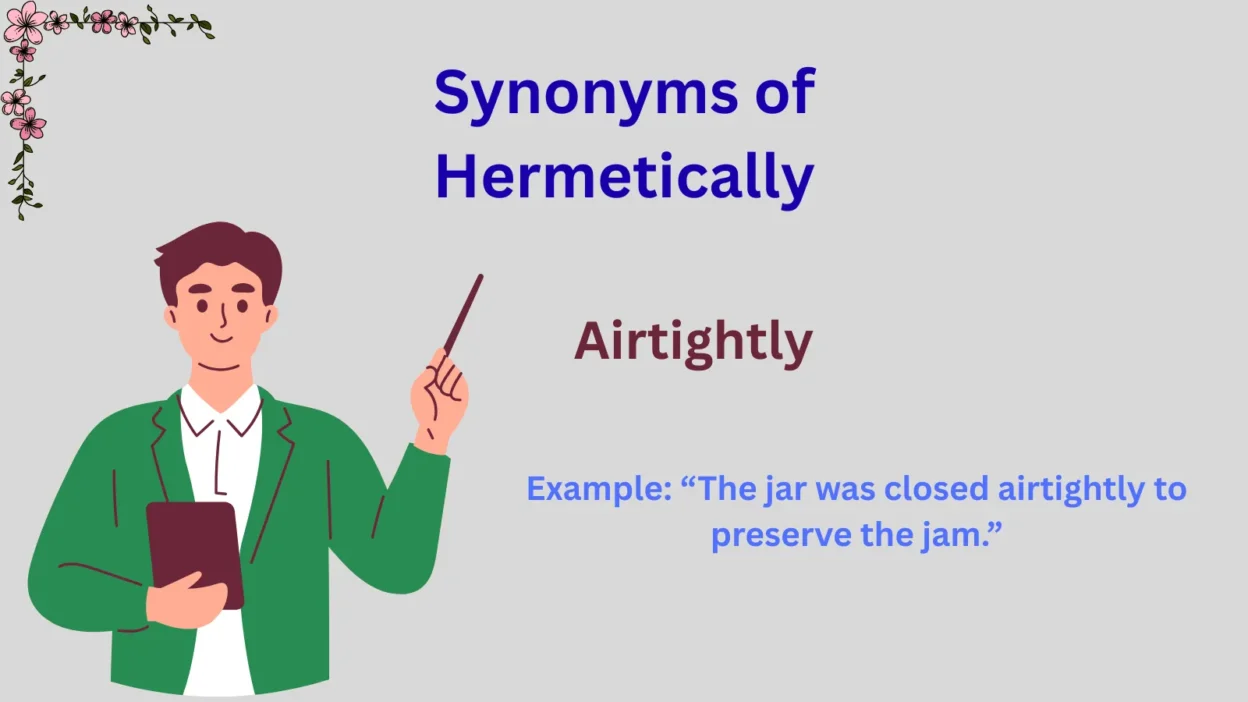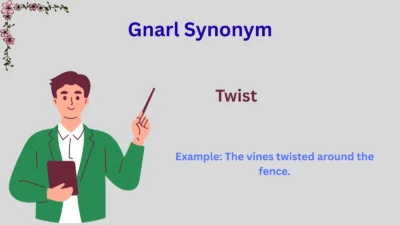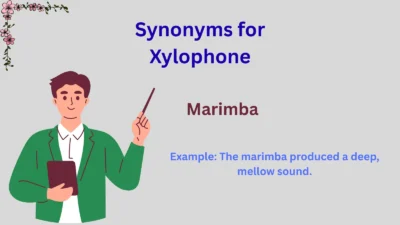Synonyms of hermetically, such as airtightly, sealed, and tight, describe something completely closed off or protected from outside air, moisture, or influence. For example, a hermetically sealed jar keeps food fresh by preventing any air from getting in. These words express total protection, security, and isolation.
If you’re writing about packaging, science, or safety, the right synonym for hermetically helps you show how something is fully enclosed or preserved.
In this guide, you’ll learn the meaning and example sentences for each synonym of hermetically, so you can describe sealed spaces or objects with clarity and precision.
Understanding the Meaning of Hermetically
Hermetically means completely sealed or closed off from outside air, moisture, or influence. It comes from the name Hermes Trismegistus, a legendary figure linked to alchemy, symbolizing secrecy and protection. Today, it’s used to describe anything tightly shut or perfectly insulated.
Depending on how it’s used, hermetically can describe:
- Airtight containers — sealed to keep air or germs out
- Protected environments — like labs or storage chambers
- Closed systems — that don’t allow outside interference
- Metaphorical isolation — when someone is emotionally or socially closed off
In short, hermetically conveys total closure—physically, mentally, or emotionally—leaving no room for leaks, intrusion, or outside effect.
30 Synonyms & Related Words for Hermetically
1. Airtightly
Description: Completely sealed so that no air can enter or escape.
Example: “The jar was closed airtightly to preserve the jam.”
Usage: Straightforward and scientific; ideal for technical or industrial contexts.
2. Sealed
Description: Closed firmly to prevent entry or escape.
Example: “The envelope was sealed with wax.”
Usage: General and flexible; can be literal or metaphorical.
3. Tight
Description: Firmly closed or fitted to keep air or fluid out.
Example: “Make sure the lid is tight before storing it.”
Usage: Common in everyday speech; less formal than hermetically.
4. Closed
Description: Not open or accessible.
Example: “The windows were tightly closed during the storm.”
Usage: Broad term; neutral tone; useful in everyday or descriptive writing.
5. Watertight
Description: Impervious to water; completely sealed.
Example: “The container was watertight to protect its contents.”
Usage: Technical; also metaphorical for foolproof logic or plans.
6. Airtight
Description: Preventing air from entering or escaping.
Example: “The airtight packaging kept the snacks fresh.”
Usage: The closest synonym to hermetically; suitable in both literal and figurative use.
7. Impenetrably
Description: Impossible to pass through or understand.
Example: “The forest was impenetrably dense.”
Usage: Best for figurative use — describing barriers, secrecy, or complexity.
8. Completely sealed
Description: Fully closed off with no gaps or leaks.
Example: “The container remained completely sealed for months.”
Usage: Descriptive and precise; fits scientific, culinary, or preservation contexts.
9. Vacuum-sealed
Description: Sealed by removing air from the container.
Example: “The vacuum-sealed bag kept the coffee beans fresh.”
Usage: Technical; often used in packaging or food storage.
10. Confined
Description: Kept within limits or closed space.
Example: “The gases were confined within the chamber.”
Usage: Broader sense; useful for describing physical or metaphorical restriction.
11. Enclosed
Description: Surrounded or contained within boundaries.
Example: “The specimen was enclosed in glass.”
Usage: Common and versatile; works for both physical and abstract contexts.
12. Isolated
Description: Detached or separated from others.
Example: “The lab was isolated to prevent contamination.”
Usage: Figurative or literal; emphasizes separation rather than sealing.
13. Locked
Description: Closed with a mechanism for security or restriction.
Example: “The box was locked and stored in a safe.”
Usage: Suggests safety and restriction; can imply secrecy.
14. Impervious
Description: Not allowing anything to pass through.
Example: “The material was impervious to moisture.”
Usage: Formal and scientific; also metaphorical for emotional or social inaccessibility.
15. Insulated
Description: Protected or shielded from outside influence or environment.
Example: “The wires were insulated against heat and cold.”
Usage: Common in technical or figurative language.
16. Cut off
Description: Disconnected or isolated from others.
Example: “The village was cut off during the blizzard.”
Usage: Informal; focuses on separation rather than sealing.
17. Shuttered
Description: Closed tightly with shutters or barriers.
Example: “The old shop was shuttered for years.”
Usage: Evokes imagery of secrecy or abandonment.
18. Encapsulated
Description: Enclosed within a capsule or protective layer.
Example: “The medicine is encapsulated in gel form.”
Usage: Technical and metaphorical; great for concise, contained ideas.
19. Bound
Description: Tied or restricted from movement or exposure.
Example: “The files were bound in a tight package.”
Usage: Works for literal bindings or figurative containment.
20. Contained
Description: Held within limits or boundaries.
Example: “The chemicals were safely contained.”
Usage: Neutral, controlled tone; fits scientific or disciplined contexts.
21. Restrained
Description: Held back or kept within bounds.
Example: “His emotions were restrained and private.”
Usage: Figurative; suggests control rather than physical sealing.
22. Self-contained
Description: Independent or operating without external input.
Example: “The self-contained unit required no external connections.”
Usage: Ideal for describing systems, communities, or mechanisms.
23. Hidden
Description: Kept out of sight or secret.
Example: “The treasure was hidden deep underground.”
Usage: Common for metaphorical secrecy; soft alternative to “hermetically sealed off.”
24. Secluded
Description: Kept apart or private from others.
Example: “The monastery was secluded from modern life.”
Usage: Best for peaceful, isolated contexts; softer tone than “sealed.”
25. Isolatingly
Description: In a way that separates or detaches completely.
Example: “He lived isolatingly, avoiding all contact.”
Usage: Emphasizes emotional or social detachment.
26. Secretly
Description: Done privately or without knowledge of others.
Example: “The group met secretly to discuss plans.”
Usage: Figurative; focuses on secrecy rather than physical closure.
27. Disconnectedly
Description: Without connection or flow to the outside.
Example: “The community functioned disconnectedly from modern society.”
Usage: Works metaphorically for social or systemic isolation.
28. Compactly
Description: Densely packed or arranged to minimize space.
Example: “The air was trapped compactly within the chamber.”
Usage: Neutral; suitable for describing precision or efficiency.
29. Unventilated
Description: Lacking air circulation or ventilation.
Example: “The unventilated basement was stuffy and warm.”
Usage: Descriptive and literal; fits environmental or architectural writing.
30. Inaccessibly
Description: Impossible to reach or enter.
Example: “The archive was stored inaccessibly in a locked vault.”
Usage: Best for figurative or physical isolation.
How to Choose the Right Synonym
The correct synonym for hermetically depends on your context and tone:
- Scientific or Technical Contexts: Use airtightly, vacuum-sealed, impervious, or watertight.
- Literal Physical Sealing: Choose sealed, tight, completely sealed, or airtight.
- Figurative or Emotional Isolation: Opt for isolated, secluded, self-contained, or hidden.
- Formal and Literary Use: Select impenetrably, encapsulated, or inaccessibly for sophistication.
- Casual or Everyday Tone: Use closed, locked, or cut off to convey simplicity.
Cultural or emotional context matters too — for example, describing a “hermetically sealed society” implies secrecy and exclusivity, while “hermetically sealed container” is purely physical. Understanding this distinction keeps your writing precise and expressive.
Conclusion :
Synonyms of hermetically—like airtightly, sealed, and tight—show the idea of complete closure and protection. Each word highlights safety, preservation, and the absence of outside influence.
Using these synonyms helps you describe containers, environments, or even emotions that are fully shut off or secure. Whether in science, writing, or everyday use, these words express how something stays pure and untouched. A hermetically sealed world reminds us that sometimes strength comes from staying closed, careful, and preserved.



